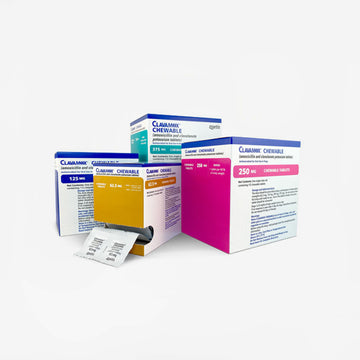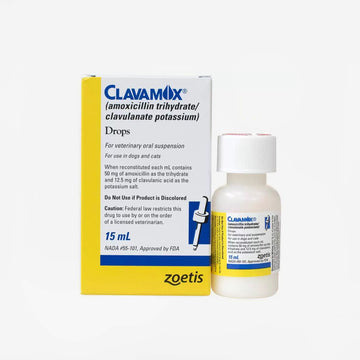Filter by
Clavamox
-

Clavamox (chewable tablet) (Rx)
$0.85 / unit
Multiple options available
-

Clavamox (suspension) (Rx)
$41.99 / unit
-
Prescriptions without the expensive vet trip
Video chat with a vet and get new prescriptions and renewals — shipped free to you.

Frequently asked questions
What is Clavamox used to treat?
What is Clavamox used to treat?
Clavamox is an antibiotic primarily prescribed to treat bacterial infections in dogs and cats. It can be effectively used to address a variety of infections, including those of the skin, urinary tract, respiratory system, and soft tissues. Whether you opt for the Clavamox (chewable tablet) (Rx) or the Clavamox (suspension) (Rx), the purpose remains consistent - to combat harmful bacteria and restore your pet's health.
Do you need a prescription for Clavamox?
Do you need a prescription for Clavamox?
Yes, Clavamox is a prescription medication. This precaution guarantees its appropriate use, taking into account factors such as the type of infection and your pet's weight, age, and overall health. Schedule a Dutch appointment today to get a prescription for your pet.
What are the side effects of Clavamox for dogs?
What are the side effects of Clavamox for dogs?
While Clavamox is generally safe, some dogs might experience side effects. The most common include vomiting, diarrhea, and a decrease in appetite. More severe reactions, though rarer, can include symptoms of an allergic reaction such as shortness of breath, hives, swelling of the lips, tongue, or face, rash, or even collapse. Some dogs might also experience yeast or fungal infections.
It's recommended to administer Clavamox twice a day with meals to minimize gastrointestinal side effects. Always be vigilant after introducing a new medication and immediately notify your veterinarian if any adverse effects are noticed. Additionally, Clavamox should be avoided in dogs with known allergies to penicillins or cephalosporins. Ensure your vet is informed about any other medications or supplements your dog is taking as well.
What are the side effects of Clavamox for cats?
What are the side effects of Clavamox for cats?
Cats, much like dogs, might experience side effects from Clavamox. Common ones include vomiting, diarrhea, and a decrease in appetite. There's also a risk, although minimal, of allergic reactions characterized by symptoms like shortness of breath, hives, facial swelling, rash, or collapse. Additionally, just as in dogs, cats might be at risk for yeast or fungal infections when taking Clavamox.
Administering Clavamox with meals twice a day can help mitigate gastrointestinal side effects. If any side effects arise or the cat's behavior or health changes, discontinue the medication and consult a vet. Cats with a history of allergic reactions to penicillins or cephalosporins should not be given Clavamox. Additionally, always inform your vet about any other medications, vitamins, or supplements your cat might be on.
What bacteria does Clavamox cover?
What bacteria does Clavamox cover?
Clavamox is a combination of amoxicillin and clavulanic acid. This duo effectively combats a broad spectrum of bacteria, making it suitable for treating various bacterial infections, including those causing skin infections and urinary infections. The clavulanic acid acts as a beta-lactamase inhibitor, preventing certain bacteria from becoming resistant to amoxicillin, thereby ensuring the antibiotic's effectiveness.
Is Clavamox right for my pet?
Is Clavamox right for my pet?
Determining if Clavamox is the right choice for your pet requires a detailed understanding of their health needs and the nature of their infection. Given the diverse range of infections and the unique nature of each pet, it's crucial to seek professional advice. If you're contemplating this treatment, try Dutch. Our vets can provide invaluable insights, ensuring that your pet gets the most suitable treatment for their condition.




